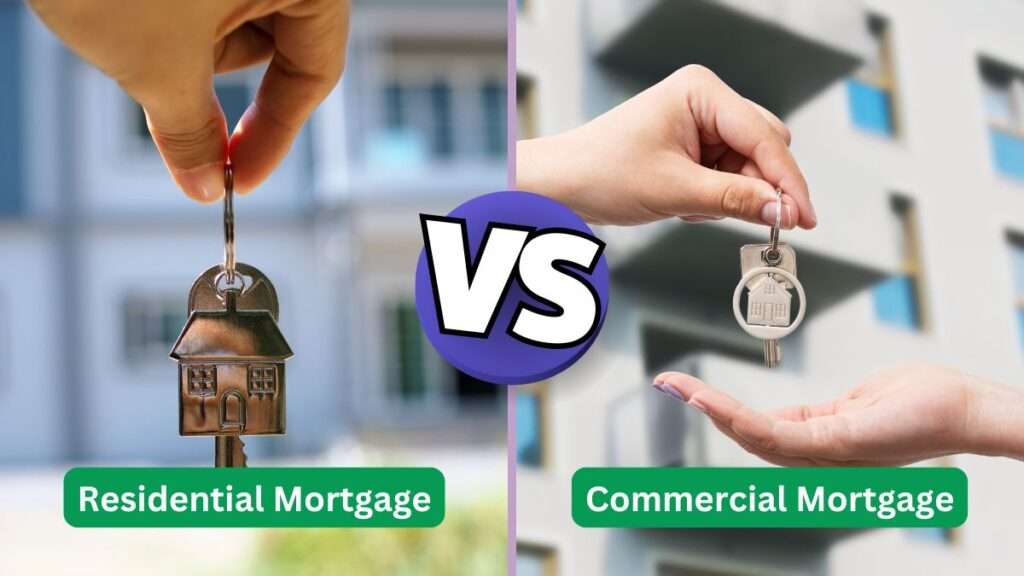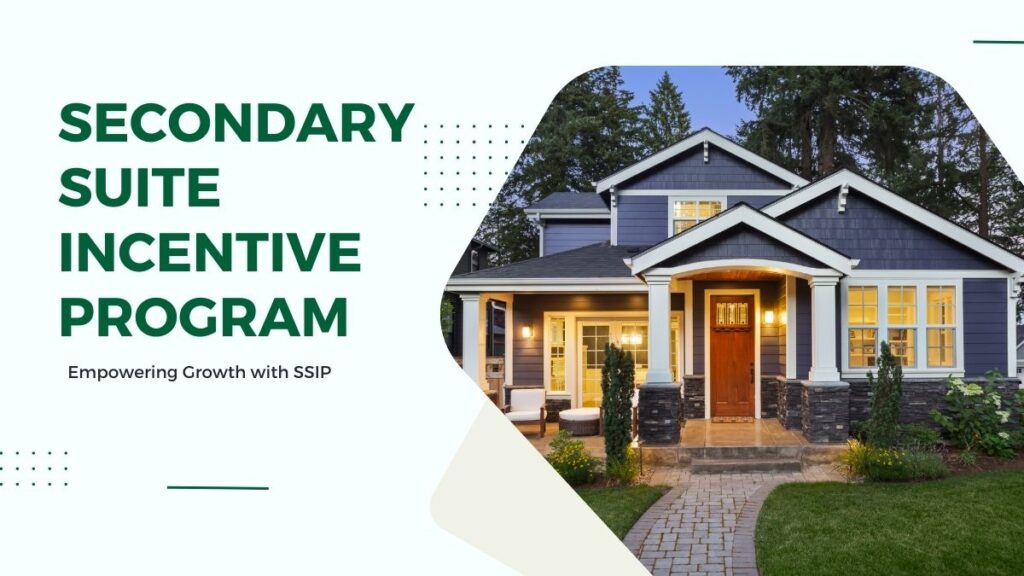If you want to buy property in Canada, it helps to know Residential Mortgage vs Commercial Mortgage. This choice can decide how much you pay, how fast you get approved, and how easy the process feels.
It is actually simple. A residential mortgage is for a home you plan to live in. A commercial mortgage is for properties that make money, like rental apartments, offices, or shops. They follow different rules, have different approval steps, and charge different interest rates.
In this guide, we will break it down in plain words. You will see when a commercial mortgage can be used for a residential property, how to compare rates, and what can make those rates go up or down.
By the end, you will know which one works best for you, whether it is a home for your family or a property for investment. AJP Mortgage can help you through it all so the process feels simple and stress free.
What Is a Residential Mortgage?
A residential mortgage is a loan you take to buy or refinance a home where people live. This can include houses, condos, or small rental properties with up to four units. This could be:
If you want to live in the property or rent out a small part of it, this is the type of mortgage you usually need.
What to know?
Loan term is usually 15 to 30 years
Interest rates are lower than commercial mortgages because homes are less risky for lenders
Down payment is often 5% to 20%, but some programs allow less
Lenders check your credit score, income, and job stability before approval
If you are looking at Residential Mortgage vs Commercial Mortgage, this is where most homebuyers start.
What Is a Commercial Mortgage?
A commercial mortgage is a loan used to buy or refinance a property that is mainly for business or income, such as office spaces, retail buildings, or rental properties with five or more units. This could be:
It is for businesses, investors, or developers who want to own or grow properties that make money.
What to know?
Loan term is usually 5 to 25 years
Interest rates are higher than residential mortgages
Some loans have a big final payment at the end
Down payment is often 20% to 35%
Lenders check your business income, credit, and the property’s value
When comparing Residential Mortgage vs Commercial Mortgage, it mostly comes down to the type of property and the purpose of the loan.
Residential Mortgage vs Commercial Mortgage: What’s the Difference?
If you want to buy property in Canada, it helps to know the mortgage rules in Canada before choosing between a residential and commercial mortgage. Both are loans, but they are used for different types of properties and have different rules.
| Feature | Residential Mortgage | Commercial Mortgage |
| Purpose | Buy or refinance a home or small rental | Buy or refinance a business or large investment property |
| Property Types | Houses, condos, townhouses, small apartments (1 to 4 units) | Office buildings, shops, warehouses, large apartments (5+ units) |
| Loan Terms | 15 to 30 years | 5 to 25 years |
| Interest Rates | Lower | Higher |
| Down Payment | 5% to 20% | 20% to 35% |
| Approval | Based on personal income and credit | Based on business income, credit, and property value |
| Flexibility | Fixed or variable rates | May include interest-only or balloon payments |
| Who Qualifies | Individuals and families | Businesses and investors |
| Risk | Lower | Higher |
Knowing these basics makes it easier to decide which loan fits your needs, whether you want a home to live in or a property to earn income.
Commercial Mortgage on Residential Property: What Does It Mean?
It can be confusing to hear about a commercial mortgage on a residential property. Here’s the simple breakdown.
If you’re buying a regular home like a house or a small apartment with up to four units, you’ll usually get a residential mortgage. But if the property has five or more units or is mainly used to earn rental income, lenders often see it as commercial.
The difference comes down to
Rates: Residential loans usually have lower interest rates. Commercial ones are higher.
Time to repay: Residential terms are longer, often 15 to 30 years. Commercial terms are shorter, usually 5 to 25 years.
Down payment: Residential can be as low as 5 percent. Commercial often needs 20 to 35 percent.
Approval: Residential depends more on your personal income and credit. Commercial looks at how much money the property makes.
Lenders treat larger rental buildings like business investments, which is why the rules change.
The bottom line
If you’re buying a property, it’s always smart to compare residential and commercial mortgage rates so you know what fits your situation best.
Compare Commercial Mortgage Rates vs Residential Mortgage Rates
A common question when choosing between a commercial mortgage and a residential mortgage is how the interest rates compare.
Here’s the simple answer
Commercial mortgage rates are usually higher than residential rates. Lenders see commercial loans as riskier because businesses can be less steady and the property’s income depends on rent or business success.
Residential mortgages often have lower rates because homes are seen as safer bets. Also, there are more rules to protect people with residential loans.
Comparison Table
| Feature | Residential Mortgage Rates | Commercial Mortgage Rates |
| Typical Rate | About 3% to 6% | Usually 4% to 9% or more |
| Rate Type | Fixed or variable | Often fixed, sometimes variable or interest-only |
| Down Payment | Lower down payment may raise rate | Higher down payment can lower rate |
| Loan Term | Longer terms lower monthly cost | Shorter terms mean higher monthly cost |
| Risk | Lower risk for lenders | Higher risk for lenders |
What does this mean for you?
If you’re buying a home or a small rental, you’ll likely get a better rate with a residential mortgage. But if you’re investing in a commercial or larger residential apartment building mortgage, expect to pay more interest.
AJP Mortgage can help you compare commercial mortgage rates vs residential rates to find the best fit for your financial goals and long-term plans.
You May Also Like: HELOC vs Mortgage
Residential Apartment Building Mortgage
Financing a residential apartment building is a bit more detailed than a regular home mortgage.
A residential apartment building usually means a property with multiple living units. If it has 1 to 4 units, it usually counts as a residential mortgage. But if it has 5 or more units, lenders often treat it as commercial, which means a commercial mortgage applies. Here’s what makes these mortgages special:
Loan Type Depends on Number of Units
1 to 4 units get a residential mortgage with easier approval and usually lower interest rates.
5 or more units need a commercial mortgage with tougher approval and higher rates.
Rental Income Matters
Lenders look closely at how much money you make from tenants. This helps decide how much you can borrow.
Down Payment Is Usually Bigger
For 5 or more units, expect to put down 20% or more.
Loan Terms Can Change
Smaller buildings have typical 15 to 30 year loans. Bigger ones often have shorter terms, 5 to 25 years, and might include special payments like balloon payments.
Managing the Property Is Important
Lenders want to see you have a plan to take care of the building and keep tenants happy.
Mixed Use Buildings Can Be Different
If part of the building is used for business, like a store, lenders might treat it as commercial even if most of it is residential.
Comparison Table
| Feature | 1 to 4 Unit Residential Apartment Building | 5 or More Unit Apartment Building (Commercial) |
| Loan Type | Residential Mortgage | Commercial Mortgage |
| Interest Rates | Lower and more stable | Higher and more variable |
| Down Payment | 5% to 20% | 20% or more |
| Loan Terms | 15 to 30 years | 5 to 25 years, sometimes balloon payments |
| Qualification Focus | Personal income and credit | Rental income, property value, business finances |
| Management Requirements | Moderate | Higher, needs a solid management plan |
Financing an apartment building is a smart way to build wealth with rental income. Since these loans can be complex, working with an experienced mortgage broker can really help.
Mortgage for Commercial and Residential Property
Sometimes people want to buy or invest in both a home and a business property. For example, you might want a house with a shop on the ground floor or an apartment building with stores below.
When this happens, your mortgage can get a bit tricky because you’re dealing with two types of properties, commercial and residential. Here’s what you should know:
Mixed-Use Properties
Some properties have both homes and businesses, like a shop on the ground floor with apartments above. In most cases, lenders treat the entire property as commercial because of the business part.
Separate Mortgages
Sometimes people end up with two mortgages, one for their home and another for their business space. For example, you might have a residential loan for the place you live in and a commercial loan for a store or office.
Loan Terms Are Different
Commercial mortgages usually come with higher interest rates, bigger down payment requirements, and shorter repayment times compared to residential mortgages. That often means higher monthly payments and more frequent renewals.
What Lenders Look For
Lenders review more than just your personal credit. They also look at your business income, financial history, and how much income the property can bring in to make sure it is a safe investment.
Extra Insurance and Rules
Commercial mortgages linked to residential properties sometimes need extra insurance. They may also come with zoning or property use rules that you do not usually face with a regular home loan.
Compare Rates
Since commercial loans tend to cost more, it is always a good idea to shop around. Different lenders will offer different rates and terms, and comparing them can save you a lot of money over time.
Let’s Check Out the Comparison Table
| Aspect | Residential Mortgage | Commercial Mortgage on Mixed-Use Property |
| Loan Purpose | Buying or refinancing a home | Financing mixed-use or business properties |
| Interest Rates | Usually lower | Higher because they are riskier |
| Loan Terms | Longer (15 to 30 years) | Shorter (5 to 25 years), sometimes with balloon payments |
| Down Payment | Usually 5% to 20% | Usually 20% or more |
| Approval | Based on personal income and credit | Looks at business income, property income, and credit |
| Rules | More consumer protections | Fewer rules and more flexible terms |
If you’re thinking about a mortgage that covers both home and business, a good mortgage broker can help you find the best option.
How AJP Mortgage Can Help With Your Commercial or Residential Mortgage?
Choosing between a residential mortgage and a commercial mortgage can feel confusing. That is where AJP Mortgage makes it easy and stress-free. Here is how we help:
Personalized Advice
We listen to what you want, whether it is buying your first home, an apartment building, or a commercial property. Then we suggest the mortgage options that truly fit your needs.
Wide Lender Network
We work with many different lenders who offer both residential and commercial mortgages. This means you can compare options and get the best rate without the stress of searching on your own.
Help With Paperwork
Mortgages come with a lot of forms and fine print. We take care of the paperwork and talk to the lenders so you do not have to worry about mistakes or delays.
Pre-Approval Support
Getting pre-approved shows sellers you are serious and ready. We guide you through each step so you understand your budget and can shop with confidence.
Ongoing Support
Our job does not end once your mortgage is approved. If you want to refinance, change your mortgage, or just ask questions later, we are here for you.
Clear Comparisons
Residential and commercial mortgages are very different. We explain the differences in plain language so you always know exactly what you are signing up for.
Case Studies
Curious about the difference between residential and commercial mortgages? Real-life case studies reveal how the right mortgage choice can save thousands, simplify financing, and make your property goals a reality.
Case Study 1: Buying a Family Home
Client: Sarah and Michael, first-time homebuyers
Goal: Buy a cozy family home with a low down payment
Challenge: They had steady jobs but not a lot saved for a down payment. They were unsure how much mortgage they could get.
How AJP Mortgage Helped?
Explained mortgage options that fit their budget
Helped them get pre-approved so they knew their price range
Guided them through all the paperwork and approval process
Found a lender with a low rate and a small down payment program
Result: Sarah and Michael bought their home with just 5 percent down. They felt confident and supported the whole way.
Case Study 2: Buying a Small Apartment Building
Client: Raj, a new investor
Goal: Buy a 4-unit apartment building to rent out
Challenge: Raj was not sure if the mortgage would be residential or commercial. He wanted the best interest rate.
How AJP Mortgage Helped?
Explained that buildings with up to 4 units usually get residential mortgages
Helped Raj prepare his financial papers
Compared many lenders to find the best rates and terms
Walked Raj through every step of the loan process
Result: Raj got a residential mortgage with a good rate. He bought the building with 10 percent down and started earning rent soon after.
Case Study 3: Buying a Mixed-Use Property
Client: Anita, a business owner
Goal: Buy a building with shops and apartments
Challenge: The property had both homes and businesses, so the mortgage was more complicated. Anita needed help understanding her options.
How AJP Mortgage Helped?
Explained that the property would be treated as commercial because of the shops
Helped Anita compare commercial mortgage rates and terms
Helped collect business and personal financial papers for approval
Negotiated with lenders for the best rate and down payment
Result: Anita got a commercial mortgage with a manageable down payment. She bought the property and now runs her business while renting the apartments.
Frequently Asked Questions (FAQs)
What is the difference between a commercial mortgage and a residential mortgage?
A residential mortgage is for homes or small rental buildings with up to 4 units. These usually have lower interest rates and longer payment plans. A commercial mortgage is for bigger buildings, businesses, or investors. These usually have higher rates and shorter payment times.
Can I get a commercial mortgage for a residential property?
Yes. If the building has 5 or more units, lenders often see it as a commercial property and give a commercial mortgage.
Are commercial mortgage rates higher than residential rates?
Yes, because commercial loans are riskier for lenders. But the rate depends on many things like the lender, your finances, and the property.
How much down payment do I need for a residential apartment building?
Usually between 15 and 25 percent. It’s more than a regular home but less than a full commercial mortgage.
How can AJP Mortgage help me get the right mortgage?
We listen to what you need, connect you with many lenders, help you with paperwork, and support you from start to finish.
Conclusion
Choosing the right mortgage can shape your financial future in a big way. If you need a residential mortgage for your home or a commercial mortgage on residential property for investment, knowing the difference helps you make the right move with confidence.
At AJP Mortgage, we keep things easy and clear. We explain your options, compare commercial and residential mortgage rates, and guide you through every step so the process feels simple and stress free.
Ready to get started? Reach out to AJP Mortgage today and let us help you find the mortgage that truly fits your goals.


